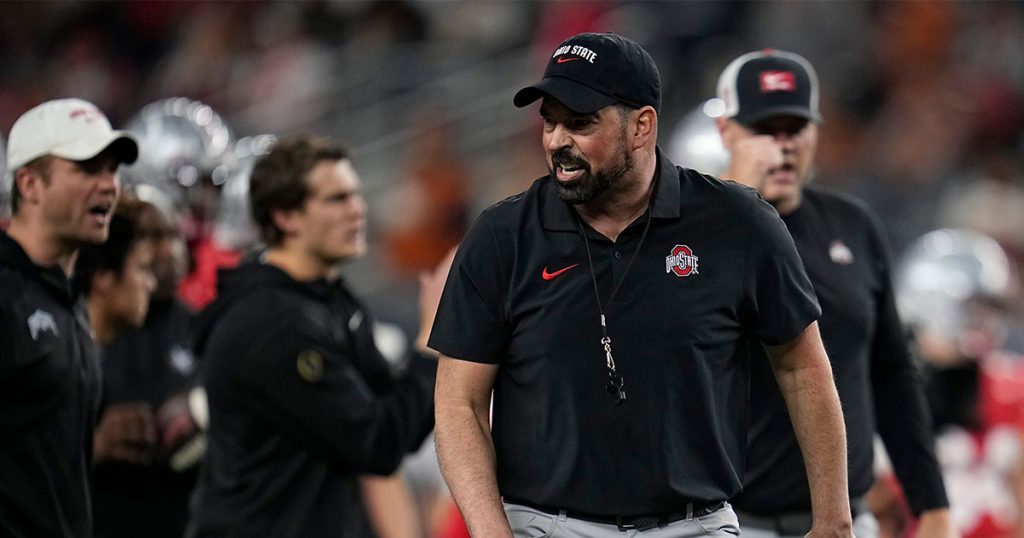The college football landscape is buzzing with discussions about the calendar following the inaugural season of the 12-team College Football Playoff. As the dust settles on a thrilling season that concluded later than ever before, many voices in the sport are calling for a reevaluation of the current schedule.
Coaches Weigh In: A Call for Change
One prominent voice in this conversation is Ohio State head coach Ryan Day, who recently celebrated his first national championship victory. Day has expressed a strong belief that starting the regular season earlier could be beneficial for the sport as a whole.
“I think the first thing is, we need to look at the calendar,” Day shared during a recent appearance on Joel Klatt’s show. “Starting a new semester for two weeks while still playing the last season doesn’t really make much sense at all for a lot of reasons. I’m not going to get into all those reasons right now, but we need to take a hard look at that.”
The Impact of a Late Finish
Day’s comments highlight several pressing concerns. The Buckeyes’ late-January finish not only detracted from their focus on recruiting and the transfer portal but also posed challenges for players eyeing the NFL. With the NFL Combine scheduled for Feb. 27 to Mar. 2, 2025, players who are injured during the postseason face a tight timeline for recovery.
This late finish raises an important question: How can college football players adequately prepare for their professional futures if the season drags on into late January? The previous season’s championship game was played on Jan. 8, just a couple of weeks earlier, but the shift to a 12-team playoff format has extended the postseason significantly.
The New Norm: 12-Team Playoff Format
As we embrace this new playoff model, the number of games played from the first round to the national championship now spans roughly a month. This extended postseason not only affects players but also alters the rhythm of college football as a whole. If the title game were to be scheduled for Jan. 1, it would necessitate an earlier start to the season, potentially pushing the kickoff to early or mid-August.
But what does this mean for the tradition of college football? New Year’s Day has long been synonymous with some of the sport’s most prestigious bowl games. Klatt has previously argued that the national championship should be played on this iconic date, but the logistics of a larger playoff model complicate that vision.
Looking Ahead: The 2025 Schedule
For now, the 2025 college football season is slated to kick off on Aug. 30, with playoffs expected to stretch deep into January once again. This raises yet another question: Will players and coaches be able to adapt to a new rhythm, or will the demands of the extended season take a toll on their performance and well-being?
As fans, we all want to see the best of our teams, but we must also consider the implications of a packed schedule. The potential expansion of the playoffs to a 14 or 16-team model adds another layer of complexity. If this happens, we could be looking at an even later national championship game, pushing the timeline further into the new year.
The Future of College Football
The conversations surrounding the college football calendar are not merely academic; they have real implications for players, coaches, and fans alike. As we witness the evolution of the sport, it’s crucial to consider how these changes affect the experience for everyone involved.
The heart of college football lies in its traditions, rivalries, and the sheer excitement of game days. But as we move forward, we must also be willing to adapt and innovate. What will the future hold for college football? Will we see a shift in the calendar that better accommodates the needs of players and the demands of the sport?
In the coming months, as discussions continue and decisions are made, one thing is certain: the landscape of college football is changing, and we are all eager to see how it unfolds. The passion for the game remains strong, and as fans, we will continue to support our teams through every twist and turn.
As we look ahead, let’s keep the dialogue open. What changes do you think are necessary for the future of college football? The excitement of the game is what brings us together, and it’s essential that we keep the conversation going to ensure a bright future for this beloved sport.





























